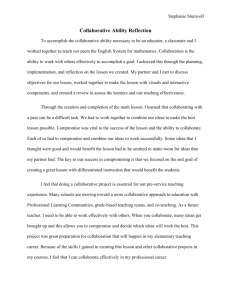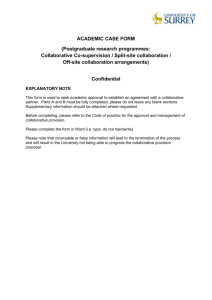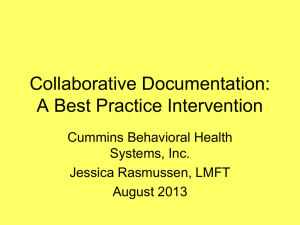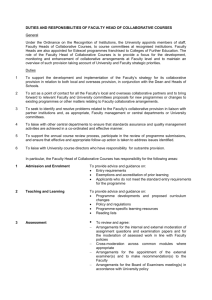Tier 1 Principle to Collaborate
advertisement
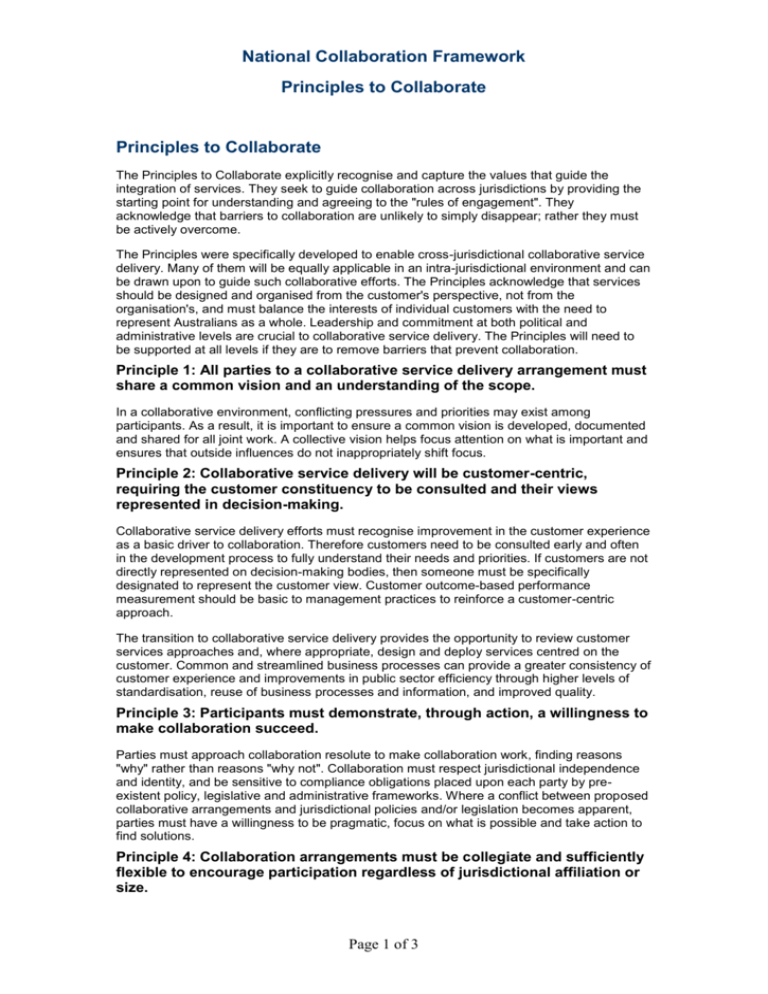
National Collaboration Framework Principles to Collaborate Principles to Collaborate The Principles to Collaborate explicitly recognise and capture the values that guide the integration of services. They seek to guide collaboration across jurisdictions by providing the starting point for understanding and agreeing to the "rules of engagement". They acknowledge that barriers to collaboration are unlikely to simply disappear; rather they must be actively overcome. The Principles were specifically developed to enable cross-jurisdictional collaborative service delivery. Many of them will be equally applicable in an intra-jurisdictional environment and can be drawn upon to guide such collaborative efforts. The Principles acknowledge that services should be designed and organised from the customer's perspective, not from the organisation's, and must balance the interests of individual customers with the need to represent Australians as a whole. Leadership and commitment at both political and administrative levels are crucial to collaborative service delivery. The Principles will need to be supported at all levels if they are to remove barriers that prevent collaboration. Principle 1: All parties to a collaborative service delivery arrangement must share a common vision and an understanding of the scope. In a collaborative environment, conflicting pressures and priorities may exist among participants. As a result, it is important to ensure a common vision is developed, documented and shared for all joint work. A collective vision helps focus attention on what is important and ensures that outside influences do not inappropriately shift focus. Principle 2: Collaborative service delivery will be customer-centric, requiring the customer constituency to be consulted and their views represented in decision-making. Collaborative service delivery efforts must recognise improvement in the customer experience as a basic driver to collaboration. Therefore customers need to be consulted early and often in the development process to fully understand their needs and priorities. If customers are not directly represented on decision-making bodies, then someone must be specifically designated to represent the customer view. Customer outcome-based performance measurement should be basic to management practices to reinforce a customer-centric approach. The transition to collaborative service delivery provides the opportunity to review customer services approaches and, where appropriate, design and deploy services centred on the customer. Common and streamlined business processes can provide a greater consistency of customer experience and improvements in public sector efficiency through higher levels of standardisation, reuse of business processes and information, and improved quality. Principle 3: Participants must demonstrate, through action, a willingness to make collaboration succeed. Parties must approach collaboration resolute to make collaboration work, finding reasons "why" rather than reasons "why not". Collaboration must respect jurisdictional independence and identity, and be sensitive to compliance obligations placed upon each party by preexistent policy, legislative and administrative frameworks. Where a conflict between proposed collaborative arrangements and jurisdictional policies and/or legislation becomes apparent, parties must have a willingness to be pragmatic, focus on what is possible and take action to find solutions. Principle 4: Collaboration arrangements must be collegiate and sufficiently flexible to encourage participation regardless of jurisdictional affiliation or size. Page 1 of 3 National Collaboration Framework Principles to Collaborate Collaboration arrangements must be flexible enough to allow for different participation levels in order to maximise project exposure to all relevant parties. Where possible, inclusive cross-jurisdictional structures (for example representative sub-committees) must be used in the decision-making process. Principle 5: A standards based approach to collaboration will be employed whereby relevant standards and guidelines will be agreed early to steer all collaboration work. A standard is "...a practice, product or guideline that is widely employed or recognised. It can be used as a model of authority and good practice and is used to assure quality and consistency". Widely accepted and endorsed standards and guidelines exist in areas relevant to service integration from good governance guidelines to technical standards. Existing standards will be adopted where appropriate with preference given to standards that have the broadest application. Standards will be applied at all levels of collaboration i.e. at the technical level to support the development of a secure, interoperable information technology environment and at the governance level to ensure both confidence and credibility in decision making. Standards will seek, wherever possible, to build on those already being used in Australia to support collaborative service delivery. Due to their wide applicability, international standards will be adopted wherever available and appropriate. In areas where standards do not exist, a process will be agreed to determine standards. Principle 6: An analysis of all costs and benefits must underpin the initial decision and sustain the ongoing case to deliver collaborative services. In order to be worthwhile and sustainable, the development of an integrated service must be founded on a full analysis of costs and benefits, tangible and intangible, real and imputed, capital and recurrent. The costs and benefits should be supported at senior political and executive levels with consistency between jurisdictions regarding what defines and comprises costs and benefits. The articulation of the costs and benefits may take the form of a business case, however, other cost/benefit analysis tools could be used. Determining an appropriate lifecycle over which to determine the profile of benefits and costs must underpin the case to integrate a service. The accrual of costs/benefits on a whole-of-government basis must be considered as well as those for individual agencies. Funding models may be used to balance inequalities between the costs and benefits to individual agencies. Principle 7: Governance arrangements in a collaborative environment must be explicit, open, transparent and sustainable and include a clear definition of accountabilities. Governance arrangements must be both sustainable and progressively refined in recognition that the collaborative service delivery is not neat or linear, rather an iterative process. They must also be robust enough to anticipate and mitigate risks associated with changes in areas such as policy, personnel, government, and senior executive leaders. With collaboration comprising multiple participants with differing objectives and modus operandi, a danger exists of becoming overwhelmed by unnecessary bureaucratic measures. Therefore governance mechanisms must be consistently kept to the minimum needed to achieve desired business objectives. The governance model adopted must be explicit, clarifying roles, responsibilities and accountability structures. It must support a clear understanding of relationships between the collaborating parties and the customers, and it must distinguish between shared and Page 2 of 3 National Collaboration Framework Principles to Collaborate individual accountabilities. This principle applies equally when collaboration involves a private sector partnership. Principle 8: Collaborative service delivery initiatives must be delivered in a secure environment with acceptable levels of privacy and confidentiality protection. Customers must be confident that reasonable steps will be taken to assure the security, privacy and confidentiality of any stored information. Any application of privacy law must give clients reasonable control over how their own personal information is used and minimise the risk that it could be misused. Informed consent must be provided prior to personal information being collected and disclosed for the purpose of referral to another jurisdiction or agency. Principle 9: An express agreement between parties must support any collaborative service delivery. The working arrangements/rules of engagement between integrating parties must be documented, signed by appropriate agents, and in an appropriate form i.e. MOU, SLA, contract or combination of these. Page 3 of 3
